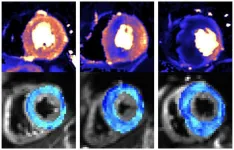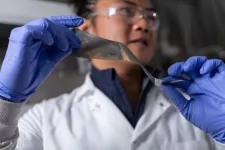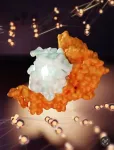(Press-News.org) The research, funded by the British Heart Foundation and published in the journal Circulation, opens the prospect of treating the condition at the earliest stages.
Being able to detect HCM earlier than ever before will also assist trials investigating gene therapies and drug treatments aimed at stopping the disease developing in those at risk.
HCM is an inherited condition that affects around 1 in 500 people in the UK. It causes the muscular walls of the heart to become thicker than normal, affecting how well the heart can pump blood around the body. It is a leading cause of heart failure and sudden cardiac death.
Researchers from UCL, Barts Heart Centre and University of Leeds studied the hearts of three groups: healthy people, people who already had HCM, and people with an HCM-causing genetic mutation but no overt signs of disease (no heart muscle thickening).
To do this, they used two cutting-edge heart scanning techniques: cardiac diffusion tensor imaging (cDTI), a type of MRI scan that shows how individual heart muscle cells are organised and packed together (the heart’s microstructure), and cardiac MRI perfusion (perfusion CMR), which detects problems with the small blood vessels supplying the heart muscle (microvascular disease).
The scans showed that people with overt signs of HCM have very abnormal organisation of their heart muscle cells, and a high rate and severity of microvascular disease compared to healthy volunteers.
Crucially, the scans were also able to identify abnormal microstructure (muscle cell disorganisation) and microvascular disease in the people who had a problematic gene but no symptoms or muscle thickening. They found that 28% had defects in their blood supply, compared to healthy volunteers. This meant that doctors were able to more accurately spot the early signs of HCM developing in patient’s hearts.
The first drug to slow HCM progression – mavacamten – has recently been approved for use in Europe and will allow doctors to reduce the severity of the disease once symptoms and muscle thickening have appeared. Genetic therapies are also in development which could prevent symptoms entirely by intercepting HCM development at an early stage.
Perfusion CMR is already being used in some clinics to help differentiate people with HCM from other causes of muscle thickening. The researchers think that these revolutionary new therapies, combined with cDTI and perfusion CMR scans, give doctors the best ever chance of treating people at risk of HCM early enough that the condition never develops.
Dr George Joy, who led the research with Professor James Moon and Dr Luis Lopes (all UCL Institute of Cardiovascular Science), said: “The ability to detect early signs of HCM could be crucial in trials testing treatments aimed at preventing early disease from progressing or correcting genetic mutations. The scans could also enable treatment to start earlier than we previously thought possible.
“We now want to see if we can use the scans to identify which patients without symptoms or heart muscle thickening are most at risk of developing severe HCM and its life-changing complications. The information provided from scans could therefore help doctors make better decisions on how best to care for each patient.“
Dr Luis Lopes (UCL Institute of Cardiovascular Science), senior author of the study, said: “By linking advanced imaging to our cohort of HCM patients (and relatives) with extensive genetic testing, this study detected microstructural abnormalities in vivo in mutation carriers for the first time and was the first to compare these parameters in HCM patients with and without a causal mutation.
“The findings allow us to understand more about the early subclinical manifestations of this serious condition but also provide additional clinical tools for screening, monitoring and hopefully in the near future for therapeutic decision-making.”
END
New scanning methods can detect deadly heart condition before symptoms appear
Combining two types of heart scan techniques could help doctors to detect the deadly heart condition hypertrophic cardiomyopathy (HCM) before symptoms and signs on conventional tests appear, according to a new study led by UCL researchers.
2023-07-19
ELSE PRESS RELEASES FROM THIS DATE:
Why ongoing worker safety training is critical to effective disaster response
2023-07-19
When it comes to disaster response and recovery operations, it is crucial that workers are prepared before there is an emergency, according to Rutgers researchers.
Their study, published in New Solutions: A Journal of Environmental and Occupational Health Policy, outlines the importance of the Worker Training Program to United States emergency and disaster-response infrastructure.
"It is essential to identify and deliver core disaster training to responders and workers on a routine basis prior to an [emergency] event," said Mitchel Rosen, an associate professor at the Rutgers School of Public Health. “The failure ...
MD Anderson research highlights for July 19, 2023
2023-07-19
HOUSTON ― The University of Texas MD Anderson Cancer Center’s Research Highlights showcases the latest breakthroughs in cancer care, research and prevention. These advances are made possible through seamless collaboration between MD Anderson’s world-leading clinicians and scientists, bringing discoveries from the lab to the clinic and back.
Recent developments include promising results from combining immunotherapy with radiation for non-small cell lung cancer (NSCLC), a novel combination therapy for secondary and treatment-resistant ...
Aluminum materials show promising performance for safer, cheaper, more powerful batteries
2023-07-19
A good battery needs two things: high energy density to power devices, and stability, so it can be safely and reliably recharged thousands of times. For the past three decades, lithium-ion batteries have reigned supreme — proving their performance in smartphones, laptops, and electric vehicles.
But battery researchers have begun to approach the limits of lithium-ion. As next-generation long-range vehicles and electric aircraft start to arrive on the market, the search for safer, cheaper, and more powerful ...
Noninvasive method for vagus nerve stimulation shows promise for enhancing motor rehabilitation after stroke
2023-07-19
The longest nerve in the human body starts in the brain and meanders its way down the neck and into the chest, where it splits into separate branches, winding its twisting tendrils to touch each internal organ. Known as the “information superhighway” and aptly named from the Latin word meaning “wanders,” the vagus nerve is a bundle of fibers responsible for the parasympathetic nervous system: digestion, heart rate, breathing.
Sending electrical impulses down this tenth cranial nerve has proven effective in treating conditions like depression and epilepsy, ...
Dedicated older people’s emergency department reduces wait times
2023-07-19
The formation of the country’s first emergency department for the over 80s led to a significant decrease in time spent in A&E – according to research from the Norfolk and Norwich University Hospital (NNUH) and University of East Anglia (UEA).
The first Older People’s Emergency Department in England was opened at NNUH in December 2017 to bring specialists in older people’s medicine to the front doors of the hospital and provide earlier assessment and treatment for patients.
A new study evaluates the outcomes for patients who received treatment in the main emergency department at NNUH and a similar ...
Genetics explains why some individuals never have COVID-19 symptoms
2023-07-19
Have you ever wondered why some people never became sick from COVID-19? A study published today in Nature shows that common genetic variation among people is responsible for mediating SARS-CoV-2 asymptomatic infection. The results indicate that individuals having this variant never feel sick once infected. This exciting discovery was a result of a U.S.-Australia collaborative work led by Danillo Augusto, Ph.D., assistant professor at the University of North Carolina at Charlotte; Jill Hollenbach, Ph.D., professor ...
Unveiling the quantum dance: Experiments reveal nexus of vibrational and electronic dynamics
2023-07-19
Nearly a century ago, physicists Max Born and J. Robert Oppenheimer developed an assumption regarding how quantum mechanics plays out in molecules, which are comprised of intricate systems of nuclei and electrons. The Born-Oppenheimer approximation assumes that the motion of nuclei and electrons in a molecule are independent of each other and can be treated separately.
This model works the vast majority of the time, but scientists are testing its limits. Recently, a team of scientists demonstrated the breakdown ...
Gender disparities in Lyme disease: Women face higher risk of severe and prolonged illness
2023-07-19
Women with Lyme disease take longer to get diagnosed, have more severe symptoms and experience higher rates of disability when compared to men. They may also be more likely to develop persistent Lyme disease. Those are among the findings of a recent study that analyzed information from the MyLymeData patient registry. The results have been published in the International Journal of General Medicine.
The present study, which was conducted by LymeDisease.org, a research and advocacy organization, assessed sex-based differences in Lyme disease patients who remained ill for six months or more after antibiotic treatment. In ...
New study uses gene prediction tool to select premium grade Angus herds in Missouri and across the United States
2023-07-19
Ranches across the Show-Me State manage approximately two million cattle — a significant number of which are Angus, a top-tier breed that has unrivaled success in the commercial beef market. In a new study, University of Missouri researcher Jared Decker and Thompson Research Farm tested a group of commercial Angus cows using a commercial genomic prediction tool called Zoetis GeneMax Advantage to investigate the ability of the test to predict their calves’ performance and profitability. This project demonstrates ...
Tracing maternal behavior to brain immune function
2023-07-19
COLUMBUS, Ohio – Immune system changes in the pregnant body that protect the fetus appear to extend to the brain, where a decrease in immune cells late in gestation may factor into the onset of maternal behavior, new research in rats suggests.
In adult female rats that had never given birth – which typically don’t like being around babies – depletion of these cells sped up their care for rat newborns that were placed in their cage.
The loss of these cells, called microglia, and the related uptick in motherly attentiveness were also associated with changes to neuron activity in several regions of the rat brain, suggesting ...
LAST 30 PRESS RELEASES:
Machine learning reveals Raman signatures of liquid-like ion conduction in solid electrolytes
Children’s Hospital of Philadelphia researchers emphasize benefits and risks of generative AI at different stages of childhood development
Why conversation is more like a dance than an exchange of words
With Evo 2, AI can model and design the genetic code for all domains of life
Discovery of why only some early tumors survive could help catch and treat cancer at very earliest stages
Study reveals how gut bacteria and diet can reprogram fat to burn more energy
Mayo Clinic researchers link Parkinson's-related protein to faster Alzheimer's progression in women
Trends in metabolic and bariatric surgery use during the GLP-1 receptor agonist era
Loneliness, anxiety symptoms, depressive symptoms, and suicidal ideation in the all of us dataset
A decision-support system to personalize antidepressant treatment in major depressive disorder
Thunderstorms don’t just appear out of thin air - scientists' key finding to improve forecasting
Automated CT scan analysis could fast-track clinical assessments
New UNC Charlotte study reveals how just three molecules can launch gene-silencing condensates, organizing the epigenome and controlling stem cell differentiation
Oldest known bony fish fossils uncover early vertebrate evolution
High‑performance all‑solid‑state magnesium-air rechargeable battery enabled by metal-free nanoporous graphene
Improving data science education using interest‑matched examples and hands‑on data exercises
Sparkling water helps keep minds sharp during long esports sessions
Drone LiDAR surveys of abandoned roads reveal long-term debris supply driving debris-flow hazards
UGA Bioinformatics doctoral student selected for AIBS and SURA public policy fellowship
Gut microbiome connected with heart disease precursor
Nitrous oxide, a product of fertilizer use, may harm some soil bacteria
FAU lands $4.5M US Air Force T-1A Jayhawk flight simulator
SimTac: A physics-based simulator for vision-based tactile sensing with biomorphic structures
Preparing students to deal with ‘reality shock’ in the workplace
Researchers develop beating, 3D-printed heart model for surgical practice
Black soldier fly larvae show promise for safe organic waste removal
People with COPD commonly misuse medications
How periodontitis-linked bacteria accelerate osteoporosis-like bone loss through the gut
Understanding how cells take up and use isolated ‘powerhouses’ to restore energy function
Ten-point plan to deliver climate education unveiled by experts
[Press-News.org] New scanning methods can detect deadly heart condition before symptoms appearCombining two types of heart scan techniques could help doctors to detect the deadly heart condition hypertrophic cardiomyopathy (HCM) before symptoms and signs on conventional tests appear, according to a new study led by UCL researchers.






